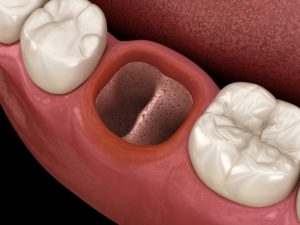
When you get a tooth removed, the chances are good that your recovery will go smoothly and your mouth will feel better within several days to a week. However, there is also a small risk that you will experience some post-procedural complications. One possible complication is known as dry socket. In this blog post, we’ll discuss what it is, the symptoms it causes, and how you may be able to prevent it.
What Is Dry Socket?
After you undergo wisdom tooth extractions — or a regular tooth extraction — a blood clot should form at the site of your procedure. The clot’s purpose is to protect the bone and other tissues underneath it and promote healing. When that blood clot fails to form, or it gets dislodged prematurely, you have what is known as a dry socket. This happens in about 2 – 5% of wisdom tooth extractions.
Symptoms of Dry Socket
Dry socket can be quite uncomfortable. Some signs and symptoms that it may cause include:
- Severe pain at the site of the extraction
- An empty-looking socket
- Visible bone in the socket
- Pain that radiates from the extraction site to other parts of your face
- Bad breath and/or a foul taste in your mouth
If you suspect that you have a dry socket, contact your oral surgeon right away. Postponing care may increase the chance that you will develop an infection. Your surgeon can clean out the area and apply a medicated dressing to encourage proper healing. They might also write a prescription for a pain medication.
Preventing Dry Socket
While your oral surgeon can certainly help you cope with dry socket, it is better to prevent this problem in the first place. Here are some tips to help you reduce your risk:
- Do not use straws for at least one week after your extraction. The suction action could dislodge your blood clot.
- Do not smoke or chew tobacco. Rapidly sucking in the smoke can disturb the blood clot, and the chemicals in tobacco products can slow down your body’s healing process.
- Eat soft foods. Crunchy and hard foods can damage a blood clot. For a few days, you should stick to soft things like applesauce, pudding, yogurt, and ice cream.
- Follow hygiene instructions. You should keep up with oral hygiene after your extraction. However, you should be extra gentle around your blood clot.
- Learn about possible medication interactions. Some medications, including oral contraceptives, are associated with a higher risk of dry socket.
You shouldn’t let fear of dry socket hold you back from undergoing necessary dental work. With a few simple precautionary measures, you can greatly increase the chances that you will enjoy an easy recovery after your extractions.
Meet the Practice
Drs. Steve Koo and William Shepard are the talented, highly skilled doctors at Piney Point Oral & Maxillofacial Surgery in Katy. Surgical wisdom tooth extractions are one of the many services they offer. If you would like to learn more about our practice or are ready to schedule a consultation, contact us at 832-535-1100.

